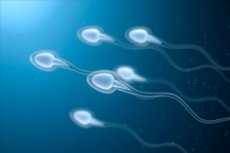Father's gut microbiota influences next generation
Sist anmeldt: 14.06.2024

Alt iLive-innhold blir gjennomgått med medisin eller faktisk kontrollert for å sikre så mye faktuell nøyaktighet som mulig.
Vi har strenge retningslinjer for innkjøp og kun kobling til anerkjente medieområder, akademiske forskningsinstitusjoner og, når det er mulig, medisinsk peer-evaluerte studier. Merk at tallene i parenteser ([1], [2], etc.) er klikkbare koblinger til disse studiene.
Hvis du føler at noe av innholdet vårt er unøyaktig, utdatert eller ellers tvilsomt, velg det og trykk Ctrl + Enter.

The study, led by Hackett's group at the European Molecular Biology Laboratory (EMBL) in Rome, found that disrupting the gut microbiome in male mice increases the risk of disease in their future offspring.
The gut microbiome is the microbial community that inhabits the gastrointestinal tract. It is responsible for the production of enzymes, metabolites and other molecules important for the host's metabolism and its response to the environment.
Consequently, a balanced gut microbiome is important for mammalian health, helping to regulate the immune and endocrine systems. This in turn affects the physiology of tissues throughout the body. However, little was known about the influence of the gut microbiome on host reproductive function and whether an altered paternal microbiome could affect the health of his offspring.
Hackett's group at EMBL in Rome, together with Bork and Zimmermann's groups at EMBL in Heidelberg, decided to answer this question. The results of their study, published in the journal Nature, showed that disrupting the gut microbiome in male mice increases the likelihood that their offspring will be born with low birth weight and be at increased risk of premature death..
Passing information to the next generation
To study the influence of the gut microbiome on male reproduction and their offspring, researchers changed the composition of microbes in the intestines of male mice by treating them with common antibiotics that do not enter the bloodstream. This causes a condition called dysbiosis, in which the microbial ecosystem in the gut becomes unbalanced.
The scientists then analyzed changes in the composition of important testicular metabolites. They found that dysbiosis in male mice affected testicular physiology, as well as metabolite composition and hormonal signaling. At least part of this effect was due to changes in the levels of the key hormone leptin in the blood and testicles of males with induced dysbiosis.
These observations suggest that in mammals there is a “gut-germline axis” that is an important link between the gut, its microbiota and the germline.
To understand the importance of this "gut-germline axis" for heritable traits, scientists crossed either untreated or dysbiotic males with untreated females. Mice from dysbiotic fathers showed significantly lower birth weights and increased mortality after birth. Various combinations of antibiotics, as well as treatment with laxatives that cause dysbiosis (which also disrupt the microbiota), had similar effects on the offspring.
It is important to note that this effect is reversible. After stopping antibiotics, the fathers' microbiome is restored. When microbiome-restored mice were mated with untreated females, their offspring were born at normal weight and developed normally.
"We observed that intergenerational effects disappear once the normal microbiome is restored. This means that any change in the gut microbiome that could cause intergenerational effects can be prevented in expectant fathers," said Peer Bork, director of EMBL Heidelberg, who participated in the study.
"The next step is to understand in detail how various environmental factors, such as drugs, including antibiotics, can affect the paternal germ lines and therefore embryonic development."
Aile Denboba, first author of the publication and a former postdoctoral fellow in Hackett's group, now group leader at the Max Planck Institute for Immunology and Epigenetics in Freiburg, Germany, added: "The study arose from a desire to understand the influence of the environment on fathers, looking at the gut microbiome as a link host-environment interactions, creating a sufficient cause model for assessing intergenerational health risks in complex ecological systems."
The influence of fathers on the risk of diseases during pregnancy
In their work, Hackett and his colleagues also found that placental defects, including poor vascularization and slow growth, were more common in pregnancies involving dysbiotic males. The defective placentas showed signs of a common pregnancy complication in humans called preeclampsia, which leads to poor growth of offspring and is a risk factor for a wide range of diseases later in life.
"Our research demonstrates the existence of a communication channel between the gut microbiome and the reproductive system in mammals. Moreover, environmental factors that disrupt these signals in expectant fathers increase the risk of adverse offspring health by altering placental development," said Jamie Hackett, Coordinator research project and group leader EMBL Rome
"This implies that in mice, the paternal environment immediately before conception can influence offspring traits independent of genetic inheritance."
"At the same time, we have found that this effect is observed in only one generation, and I must emphasize that more research needs to be done to examine how widespread these effects are and whether they are meaningful in humans. There are innate differences that need to be taken into account when translating mouse studies to humans."
Hackett continued: “But given the widespread use of dietary and antibiotic practices in Western culture that are known to disrupt the gut microbiome, it is important to take a closer look at the intergenerational effects of fathers and how they may influence pregnancy outcomes and disease risk in the population.” "
